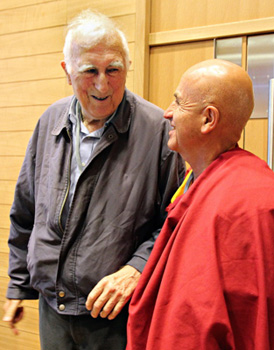For many years, I had hoped to have the chance to meet with Jean Vanier, the founder of L’Arche. The opportunity finally presented itself at the MEDEF Summer University, which gathers not only business leaders, but also social entrepreneurs and big-hearted individuals who seek to be of service to others. It was during a round table whose theme was ‟Invest yourself!”
Jean Vanier said: ‟Wealth is merely relative. I do not especially want the rich to have less money and the poor to have more. What I would like is for each side to meet, to listen to one another. It is only by listening to each other that there can be genuine meetings, that people can change, and that things can change. One day, when I was in the marines, I said to myself that I could focus my energies otherwise: I wanted to be a disciple of Jesus, Martin Luther King, Jr., Mahatma Gandhi, of people who fight for peace and justice in a non-violent way. In 1940, I discovered that there are disabled people who are locked up in institutions, mistreated, and considered crazy. I did not want to become part of the system. All I could do was to take in two men who resided in these violent and painful institutions. I started to live with them. It was the three of us. I was the one who did the cooking. And so, we ate very badly. However, I discovered some very important things. I thought that I was going to ‟do them some good,” but it was them who put me on the path, who helped me to understand that the walls that prevent people from meeting one another must be torn down.

‟Living together, discovering the beauty in a relationship with individuals who have not been able to develop their mind, their abilities, but who nevertheless have the capacity to celebrate life, to be happy — and this in a world where we seek to become independent, to ‟win,” etc.
‟L’Arche has grown. We now have 150 communities across the world, in challenging areas — in Haiti, Palestine, Bangladesh, France, and in most of the European countries. These are houses where disabled people live together with others, working, laughing, and celebrating life together. Some of these communities are small, but they are a symbol, one of hope. Our world is suffering from despair. We can always be a symbol of hope for others. There are many wonderful people.
‟What I have discovered is that each human being is the same. But we hide behind walls, walls of power, walls of possession. And so, the only thing I want to say is that what is important — and you know this well — is that businesses prefer to pay fines rather than welcome a person who has a disability. In so doing, they deprive themselves of something. I would like to tell you some things that may seem idyllic, impossible but true: If you listen and allow men and women who have a disability to be a part of your businesses, individuals who may not be highly qualified, but who, even though they are fragile, are nevertheless qualified in a given domain — they can, above all, inspire a new spirit. That is what I have discovered, and that is the message that L’Arche can spread, little by little, across the world: people understand that walls must be torn down, that it is necessary to listen, to come together, to be glad to be human beings together. The only thing I would like to say to your businesses is: give yourself the joy of greeting men and women who may be very fragile, but know that each possesses qualifications and that each can transform your business into a workplace that is more genuine and one that promotes greater humanity.
Short biographical notes about Jean Vanier
At just 13, Jean Vanier entered England’s Royal Naval Academy. He served in the British Navy and then the Royal Canadian Navy. In 1950, looking for deeper meaning in his life, he resigned his commission in the navy and began a period of spiritual search. He worked on a doctorate in philosophy, which he received from the Institut Catholique in Paris, and after teaching at St. Michael’s College, University of Toronto, he then returned to France.
Distressed by the plight of people with developmental disabilities, in 1964 he welcomed two men from an institution to live with him in a little home he called ‟L’Arche,” after Noah’s ark in the French village of Trosly Breuil. L’Arche grew quickly as this new way of sharing life together in community with people who would otherwise be shut away in institutions attracted many young people. And Vanier himself began traveling and speaking about his own life-changing experience of coming to know people with developmental disabilities. Today, there are 150 ‟L’Arche” communities in 30 countries on six continents.
Jean Vanier has become a leader in consciousness-raising about the suffering of all who are marginalized. He is internationally recognized for his compelling vision of what it means to live a fully human life and for his social and spiritual leadership in building a compassionate society.